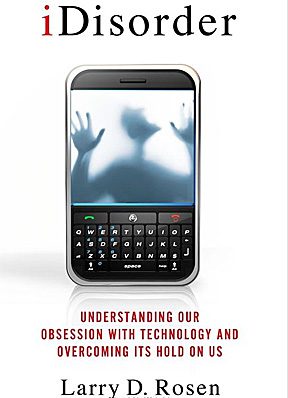Is digital technology making you crazy? Yes, quite possibly, says Dr. Larry Rosen, professor of psychology and author of a new book: iDisorder: Understanding Our Obsession with Technology and Overcoming Its Hold on Us.
 I learned about this book from a review in the New York Times: “When You Text Till You Drop,” by Bryan Burrough. Here’s how Burrough gets into the subject:
I learned about this book from a review in the New York Times: “When You Text Till You Drop,” by Bryan Burrough. Here’s how Burrough gets into the subject:
What about that gent who was talking loudly into his Android phone on the Metro-North train this morning? Was he really that obnoxious before we all went wireless — or did the device somehow change him? And what about all those young people who spend hours upon hours texting and sexting and Facebooking? What kinds of adults will they become?
Is the casual anonymity of Internet discussion turning us into boors? What did we once do with all the hours we now spend obsessively checking e-mail and texts? Smoke?
Larry D. Rosen, a California psychologist, is less concerned with techno-boorishness than with the very real possibility that all these new personal gadgets may be making some of us mentally ill — especially those who are prone to narcissism, for example, or to depression or obsessive-compulsive disorder.
In “iDisorder: Understanding Our Obsession With Technology and Overcoming Its Hold on Us” (Palgrave Macmillan), Dr. Rosen surveys the existing research, throws in a bit of his own and suggests ways that users of new technologies can avoid behavioral pitfalls.
My first reaction to this description was negative. “Oh no,” I thought, one more book on the dangers of technology, one more inane effort to get us to stop using our computers and smartphones. But, according to Burrough, Rosen is not anti-technology or unrealistic about its use:
One strength of “iDisorder” is Dr. Rosen’s cleareyed view of technology and its uses. He doesn’t oppose it. In fact, his view is quite the opposite. What we need, he says, is a sense of restorative balance and self-awareness. It is unavoidable that many of us will fall prey to an iDisorder, he says, but “it is not fatal and we are not doomed to spend time in a mental institution or a rehab center.”
So how does Rosen present evidence for his thesis about iDisorders?
The book’s chapters focus on mental health challenges linked to heavy technology use. They include how social media sites may spawn narcissism (no surprise there) and how constantly checking our wireless mobile devices (he calls them W.M.D.’s, a great acronym) can lead to obsessive-compulsive disorder. Others look at how technology addiction can lead to attention-deficit hyperactivity disorder, and at how all that medical data available online has created a class of people known as “cyberchondriacs.” Perhaps most interesting of all, Dr. Rosen examines how the constant use of technology may be rewiring our brains.
Burrough’s description of iDisorder rewired my brain, from an initial negativity about the book to a desire to read it. According to my Kindle, I’m now 7% into the book. I am finding it engaging, at least worth another 7% of reading. Rosen, though an academic, is an able writer. Plus, he promises to offer practical helps for those of us who may be developing an iDisorder. I figure the odds are pretty great that I fall into this category. Here is one suggestion highlighted by Burrough:
For those combating some form of techno-addiction, Dr. Rosen advises regularly stepping away from the computer for a few minutes and connecting with nature; just standing in your driveway and staring at the bushes, research shows, has a way of resetting our brains.
Now that sounds like a good idea . . . .










